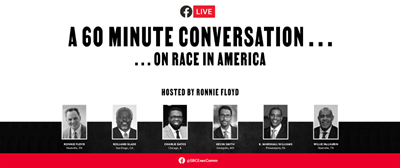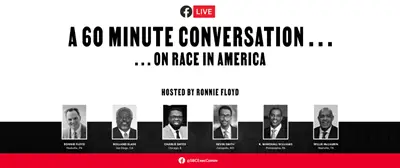EDITOR’S NOTE: This is a follow-up article from the original article yesterday. A link to the video is at the end of this article.

NASHVILLE (BP) — Calling the racial unrest roiling the nation “spiritual warfare,” and saying “unless hearts change, nothing will change in America,” Philadelphia pastor K. Marshall Williams urged Southern Baptists to stand together in unity against injustice.
“The world is waiting for us to come together,” said Williams, senior pastor of Nazarene Baptist Church of Philadelphia. “Because Beloved, truth be told, this is just a dress rehearsal for when we get around the throne. I think maybe God is stripping us. I don’t know about you, but this has been a stripping time for me, a pruning time for me, a time in the refiner’s fire, that God would see what He really has as far as the church of the Lord Jesus Christ.”
Williams’ comments came during “A 60 Minute Conversation on Race in America,” a panel discussion hosted online Wednesday (June 17) by Ronnie Floyd, president and CEO of the SBC Executive Committee, who brought together five African American Southern Baptist pastors and leaders. Along with Williams, panelists included Rolland Slade, senior pastor of Meridian Baptist Church of El Cajon, Calif., and newly elected chairman of the SBC Executive Committee; Charlie Dates, pastor of Progressive Baptist Church in Chicago; Kevin Smith, executive director of the Baptist Convention of Maryland/Delaware; and Willie McLaurin, vice president of Great Commission relations and mobilization of the SBC EC.
While thanking Floyd for convening the call, Dates said “this is a very tiring conversation, not simply because of the events of recent weeks … [but] because this has been a 401-year struggle for African Americans.” Dates added that real change would come from pastors joining together to combat racism.
“If the persons who proclaim the Gospel of Jesus Christ are not in the front lines of strategy and demonstration then the world will simply be blowing hot air in trying to bring change,” Dates said. “We can demonstrate the Gospel in power and in witness in leading them in peaceful protesting.”
Smith encouraged believers to view the topic through a biblical lens and to use biblical rhetoric rather than “the combat rhetoric that’s going on all around us,” adding: “If we start with the Lordship of Christ and the Scripture, we can engage with some of these tough subjects.”
McLaurin expressed a need for SBC ministry pipelines available to develop vocational leaders from an ethnically diverse perspective. While agreeing, Smith said it should extend to include discipleship for laypersons “to live as salt and light out in their communities.”
“The pipeline that is hurting us as regards race in America, as regards a lot of things in America — materialism, greed, consumerism — is discipling [church] members in such a way that when they go out in the community, they are just different than other people,” Smith said.
Asked whether the SBC is progressing on racial issues, McLaurin noted his experience as an interim pastor of 16 “predominantly Anglo churches” in Tennessee. Saying he was the first black man to preach in some of the churches, he recounted a moment when a 10-year-old boy responded to an invitation. The boy’s father came down the aisle, hugged McLaurin and asked to speak to the congregation.
“He said, ‘I wasn’t for this black man coming to be our interim pastor,'” McLaurin said, “‘but my 10-year-old son has gotten saved today and today this black pastor is my brother in the Lord. And any of you who have a racist bone in your heart, you need to come to the altar today and get it right with Jesus.’
“I don’t know what happened after that, because I was filled with tears,” McLaurin continued. “But we are making progress.”
Smith acknowledged significant positive change since the SBC’s founding 175 years ago in a split with northern Baptists over the issue of slavery, as well as since the Civil Rights movement of the 20th Century. But he said he has been discouraged in recent years by “indifference and insensitivity” from many white Christians.
“I’m certainly encouraged. Things have certainly moved and changed since 1845 and I’m comfortable saying they’ve changed since 1945,” Smith said. “But I don’t think the last decade or so … has been the best window in that long story of Christians in the United States dealing with the issue of race. And I really have a burden about it, because I think it matters evangelistically and missiologically.”
Affirming Southern Baptists’ strong, passionate stands against abortion and sexual immorality, Williams said he wanted “us to be as passionate about racism and injustice, because it’s part of the biblical mandate, Micah 6:8, to do justice.”
“I don’t think we need to write any more resolutions,” he said. “We need to put some shoe leather in it and effect some change. … Our younger generation wants to see practical application of the biblical principle. And for us right now, our hypocrisy because we haven’t acted on it and dealt with America’s original sin, it has hindered the heathen from hearing when we holler about the holy. They can’t hear us.
“And so we have a great opportunity. That’s why I’m here. That we might be a bridge-builder, a unifier, that we might stand as a collective, incarnational presence.”
Slade, who was elected Tuesday (June 16) to chair the SBC Executive Committee, challenged Floyd, whom he described as “a man of action,” to press forward into the issues of racial injustice discussed Wednesday.
“We knew that when you called, we’re gonna do something,” Slade said. “We’re gonna have a call, but I know … it’s gonna be more than just talk. This is the launching pad. We’re going on from here.”
Floyd noted that their conversation was taking place five years after the murders in Charleston, S.C., of nine African American church members by a white supremacist. The night before the killings, messengers to the 2015 SBC Annual Meeting in Columbus, Ohio, had cried out together in prayer over “matters of injustice and ungodliness,” Floyd recalled, adding: “We were on our face before God about this issue.”
Floyd said when he learned of the shooting, he said it felt as though Satan had won the battle — “But we got back up and we moved forward, we did what we could do at the time.”
Floyd urged viewers to engage in conversations like Wednesday’s, saying Psalm 133 has been “on my heart for churches and for our Southern Baptist Convention,” and quoting: “Behold, how good and how pleasant it is for brothers to dwell together in unity!”
He added: “I appeal to all of you, regardless of the color of your skin, we must fulfill what Jesus said in John 17:21,” and then quoted the verse: “May they all be one, as you, Father, are in me, and I am in You. May they also be in us, so that the world may believe you sent me.”
A recording of the “A 60-Minute Conversation: On Race in America,” can be viewed here.
This article was originally published by Baptist Press at bpnews.net

